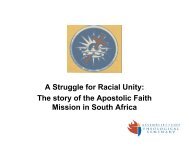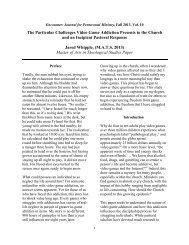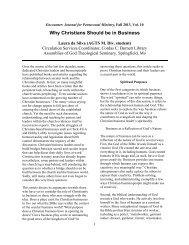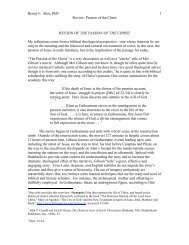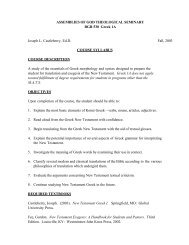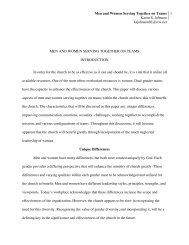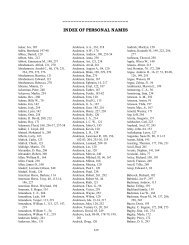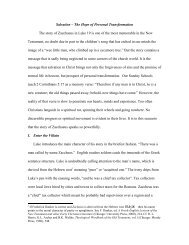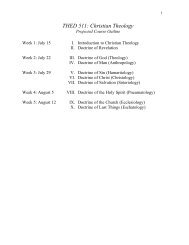Encounter: Journal for Pentecostal Ministry - Assemblies of God ...
Encounter: Journal for Pentecostal Ministry - Assemblies of God ...
Encounter: Journal for Pentecostal Ministry - Assemblies of God ...
Create successful ePaper yourself
Turn your PDF publications into a flip-book with our unique Google optimized e-Paper software.
<strong>Encounter</strong>: <strong>Journal</strong> <strong>for</strong> <strong>Pentecostal</strong> <strong>Ministry</strong>, Summer 2009, Vol. 6<br />
Book Review<br />
A Beginner’s Guide to New Testament Exegesis: Taking the Fear out <strong>of</strong> the Critical Method<br />
Richard J. Erickson<br />
(Downers Grove, IL: InterVarsity Press, 2005) 239 pages<br />
Reviewed by Bob Caldwell (Ph.D. 2009 Concordia Seminary; M.A. 2003 AGTS),<br />
Ordained minister <strong>of</strong> the <strong>Assemblies</strong> <strong>of</strong> <strong>God</strong> and free-lance writer<br />
Many present-day pastors and theologians<br />
still view modern critical methods with<br />
some suspicion, and rightly so. Most <strong>of</strong><br />
these methods arose from a generation <strong>of</strong><br />
scholars who sought to “free the Bible from<br />
the church” and “treat it like any other<br />
book.” This perspective led to ignoring the<br />
message <strong>of</strong> the text, or at least <strong>of</strong> ignoring<br />
any orthodox interpretation <strong>of</strong> it which could<br />
be applied to modern life.<br />
However, evangelical scholars have come to<br />
grips with using these tools despite their<br />
questionable parentage. When one maintains<br />
a belief that the Bible is the Word <strong>of</strong> <strong>God</strong>,<br />
the tools can then be employed to help<br />
discover the fullest and clearest<br />
understanding <strong>of</strong> the meaning <strong>of</strong> the text.<br />
Richard Erickson does a valuable service by<br />
showing how different critical tools can<br />
pr<strong>of</strong>itably be applied to the text by<br />
Evangelicals. In his hands, then, redaction<br />
criticism is not a tool <strong>for</strong> showing how the<br />
evangelist changed the early Jesus message<br />
to create someone who would speak to later<br />
concerns, but rather a tool <strong>for</strong> showing how<br />
one evangelist’s slight differences in his<br />
telling <strong>of</strong> a story adds new depth to the<br />
understanding <strong>of</strong> what Jesus taught and did.<br />
In this, he is to be commended.<br />
1<br />
Erickson, a pr<strong>of</strong>essor at Fuller Theological<br />
Seminary Northwest in Seattle, Washington,<br />
draws on over twenty years <strong>of</strong> teaching New<br />
Testament exegesis. Consequently, this book<br />
would serve well as a textbook, either in a<br />
classroom setting or by the pastor who<br />
would systematically study the book to learn<br />
more about interpreting Scripture <strong>for</strong> his or<br />
her congregation.<br />
In the first chapter, Erickson lists his<br />
assumptions in approaching the New<br />
Testament: (1) the Bible is the inspired<br />
Word <strong>of</strong> <strong>God</strong>; (2) the Bible is the “Word <strong>of</strong><br />
Life;” (3) the Church needs pastors to teach<br />
the Bible; (4) the Holy Spirit is the<br />
interpreter. While he believes that exegesis<br />
is best done from the original languages, his<br />
book is written in such a way that those<br />
without Greek or Hebrew knowledge can<br />
still use it. A pastor can use this resource<br />
without getting into trouble.<br />
My one quibble is his treatment <strong>of</strong> textual<br />
criticism. I also believe in the value <strong>of</strong> an<br />
eclectic text in establishing the closest to an<br />
original text; however, his emphasis on<br />
external evidence is somewhat out <strong>of</strong> date.<br />
While this has been the main focus <strong>of</strong><br />
textual criticism <strong>for</strong> 150 years (and still has<br />
many advocates), a significant number <strong>of</strong><br />
textual critics have moved to a more<br />
thoroughgoing eclecticism that gives greater



